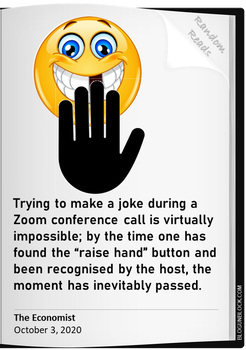|
WHEN BARTLEBY reflects on life’s lessons, he always remembers his grandfather’s last words: “A truck!” Bartleby’s uncle also suffered an early demise, falling into a vat of polish at the furniture factory. It was a terrible end but a lovely finish. Whether you find such stories amusing will depend on taste and whether you have heard them before. But a sense of humour is, by and large, a useful thing to have in life. A study of undergraduates found that those with a strong sense of humour experienced less stress and anxiety than those without it. Humour can be a particular source of comfort at work, where sometimes it can be the only healthy reaction to setbacks or irrational commands from the boss. The comedy stems, in part, from the way that the office hierarchy requires the employees to put up with the appalling behaviour of the manager. The healthiest kind of workplace humour stems from the bottom up, not from the top down. Often the most popular employees at work are those who can lighten the mood with a joke or two. Zoom has zapped humourA downside of remote working is that moments of shared humour are harder to create. Many a long meeting at The Economist has been enlivened by a subversive quip from a participant. These jokes only work when they are spontaneous and well-timed. Trying to make a joke during a Zoom conference call is virtually impossible; by the time one has found the “raise hand” button and been recognised by the host, the moment has inevitably passed. This is a shame, as most of us could do with a laugh now and again to get through the pandemic. Work is a serious matter but it cannot be taken seriously all the time. Sometimes things happen at work that are inherently ridiculous. Perhaps the technology breaks down just as the boss is in mid-oration, or a customer makes an absurd request. (Remember the probably apocryphal story of a person who rang the equipment manufacturer and asked them to fax through some more paper when the machine ran out?) There is also something deeply silly about management jargon. Most people will have sat through presentations by executives who insist on calling a spade a “manual horticultural implement”. Too many managers use long words to disguise the fact they have no coherent message to impart. Such language is ripe for satire or at the very least a collective game of “buzzword bingo”. Adapted from The Economist, October 3, 2020.
0 Comments
|
Vijayakumar Kotteri
Abstracts from works of different authors. Archives
November 2021
Categories |


 RSS Feed
RSS Feed






